38-小学英语word list-四年级下-第八册
人教精通版四年级英语下册 Lesson 8教学课件

Task 2: Fill in the blanks.
Good morning, 2 class!
Good morning, Miss Green. __W_e_l_co_m__e_t_o__o_ur__c_la_s_s__!
1 Good morning,
boys and girls.
This is _M__is_s_G__re_e_n__, our
math
ቤተ መጻሕፍቲ ባይዱ
Let’s think
How many balls? There are thirty.
How many apples ? There are thirty-five.
How many students are there in our class? There are forty.
Just talk
new _E_n_g_li_s_h_t_e_a_c_h_e_r.
How many students are there in your class?
T_h_fe_orr_et_ya_r.e _T_h_ir_ty_ boys.
And only
_t_e_n_ girls.
Task 3: Read and answer How many students are there in their class? There are forty.
How many students? There are forty students. How many boys? There are thirty boys. How many girls? There are ten girls.
Exercises
Ⅰ.I spy
小学英语 1--8册单词表

第一册MOUDLE 1hello (hi) 你好I am (I’m) 我是 goodbye(bye-bye)再见good morning 早上好How are you? 你好吗 fine(身体)很好 thank you 谢谢MODULE 2Ms 女士 too 也 and 和 boy 男孩 girl 女孩 what 什么what’s是什么 your 你的 name 名字 afternoon 下午 Mr 先生MODULE 3a(an)一个 panda 熊猫 now 现在 it is(it’s )它是 red 红的 blue 蓝的 yellow 黄的 green 绿的 black 黑的 dog 狗desk书桌 chair椅子 orange 橘黄色的MODULE 4how many 多少个 one 一 two 二 three 三 four 四 five 五 six 六seven 七eight 八 nine 九 ten 十 cap 帽子 hand 手 cat 猫MODULE 5stand up 起立 point to 指向 door 门 window 窗户 sit down 坐下bird 鸟eleven 十一 twelve 十二MODULE6pupil 小学生 this 这个 my 我的 school 学校 classroom 教室English 英语teacher 教师 that 那个 bag 书包 pencil 铅笔 pen 钢笔 book 书MODULE 7happy birthday生日快乐 head 头 to 给… on 在…上面 under 在…下面hat 帽子 where 那里 in 在……里面 cake 蛋糕 here 这里 present 礼物MODULE 8today 今天 how old 多大 know 知道 no 不,不是 dragon 龙 yes 是的 help 帮助kite 风筝 look 看MODULE 9mother 母亲 father 父亲 doctor 医生 grandpa 祖父,外祖父grandma 祖母,外祖母sister 姐妹 me 我(宾格) brother 兄弟 driver 司机 policeman 警察 farmer 农民nurse 护士 he 他 she 她MODULE 10arm 手臂 leg 腿 foot(feet) 脚 these这些 her 她的 his 他的eye 眼睛 ear 耳朵mouth 嘴 nose 鼻子MODULE 11tiger老虎 big 大的 they 他们 lion 狮子 elephant 大象monkey 猴子small小的 fat 胖的 short 矮的 tall 高的thin 瘦的 has 有MODULE 12like喜欢football足球 basketball篮球 table tennis乒乓球morning exercises 早操 swimming游泳cycling(骑)自行车skipping rope跳绳第二册MODULE1favourite特别喜欢的 song歌曲 barbie dol芭比娃娃 teddy bear 玩具熊 toy 玩具ship 轮船 computer game电脑游戏 jigsaw 拼图游戏car 小汽车MODULE2pass 传,递 rice米饭please请meat肉 bu 但是 noodles面条 fish 鱼肉 milk 牛奶chocolate 巧克力 mango芒果 banana香蕉 apple苹果pear 梨orange 橘子MODULE 3o’clock点钟 at 在…… have breakfast 吃早饭half past…点半go to school 上学have lunch 吃午饭go home 回家have dinner吃晚饭time 时间MODULE 4weekend 周play 玩,打(球)watch TV 看电视Chinese 汉语(语文课) Maths 数学课Science 科学课hot 热的New Year 新年Chinese 中国的Spring Festival 春节 see 明白,理解 we 我们family 家庭peanut 花生sweets 糖果Christmas 圣诞节England 英国sing 唱(歌)tree 树MODULE 5spring 春天warm 温暖的 summer 夏天cold 寒冷的autumn 秋天cool 凉爽winter冬天MODULE 6do 做weekend 周末Chinese 语文,汉语Maths 数学Science科学sleep 睡觉 play打today 今天Music 音乐Art 美术PE 体育MODULE 7for 给,为about 关于Spring 春节New Year新年Christmas圣诞节England 英国sing 唱歌give 给present 礼物eat 吃MODULE 8hot 热的summer 夏天spring 春天warm 暖和fly 放(风筝)autumn 秋天cool 凉爽的winter 冬天cold 寒冷的sunny 晴朗的,阳光充足的windy 有风的MODULE 9have got 拥有animal 动物sport运动dress 连衣裙,女装coat 外套sweater 毛线衫has got 拥有(have got的第三人称单数形式)T-shirt T恤衫by 乘坐,以……方式bike 自行车bus 公共汽车go to work 上班walk 步行MODULE 10on 在……上面box 盒子under 在……下面bedroom 卧室park 公园swim 游泳lake 湖snow 雪第三册单词表Module 1one 一个物品purple 紫色的pink 粉色的white 白色的orange 橙色的point 分winner 冠军thirteen 十三fourteen 十四fifteen 十五sixteen 十六seventeen 十七eighteen 十八nineteen 十九twenty 二十Module 2go straight on 直着走live 居住road 道路,街道excuse me对不起,打扰turn left 向左转turn right 向右转next to 临近的,在……旁边supermarket 超市station 车站train 火车up 向上hill 小山down 向下near 接近,临近house 房屋Module 3write 书写letter 信件,字母picture 图画friend 朋友take pictures 照相talk to 和……交谈little 小的,年幼的play with 玩,摆弄listen to 听read 阅读Module 4let’s 让我们get on 上(车)lots of 许多interesting 有趣的thing 物品,东西look at 看people 人,人们park 公园lake 湖row 划(船)boat 船men 男人;(复数)chess 象棋drink 喝,饮用hungry 饥饿的Module 5Chinese 中国的fast food 快餐want 需要,想要some 一些make 制作nice 美味的chopsticks 筷(复数)difficult困难的,难用的cook 烹饪,烧(菜)vegetable 蔬菜love 喜爱Module 6can 能够run 跑fast 快jump 跳high 高far 远ride 骑,乘flute 笛子wash 洗,清洗clothes 衣服draw 画Module 7children 孩子(复数) tomorrow 明天by plane 乘坐飞机get up 起床from 来自……China 中国swim 游泳sea 大海visit 拜访,看望stone 石头,石头的animal 动物Module 8Sports Day 运动日for 为了……,给……metre 米every day 每天good luck 好运气come on 快点,赶快high jump 跳高long jump 跳远Module 9soup 汤sorry 抱歉,对不起sweets 糖果(复数)bread 面包turn on 打开light 灯biscuit 饼干fruit 水果today 今天come in 请进of course 当然Module 10count 数数January 一月February 二月March 三月April 四月May 五月June 六月party 聚会July 七月August 八月September 九月October 十月November十一月December 十二月第四册单词表Module 1nice 好的,友善的 a bit 有一点 shy 害羞的 clever 聪明的 naughty 淘气的 cool 酷的 little 小的,年幼的 cute 可爱的Module 2capital 首都 about 关于 beautiful 美丽的 long 长的 wide 宽的many 很多的river 河流 old 古老的 famous 著名的Module 3take 带走,拿走 picnic 野餐 great 太好了 ball 球 why 为什么because 因为so 所以 homework 家庭作业 help 帮助Monday 星期一 Tuesday星期二 Wednesday星期三 Thursday星期四Friday星期五Saturday星期六 Sunday星期日Module 4robot 机器人 everything 所有事情 one day (总)有一天,housework 家务learn 学习 our 我们的 weather 天气Module 5than 比…… old 年长的 young 年轻的 strong 强壮的 Mount Qomolangma 珠穆朗玛峰 the Great Wall 长城the Summer Palace 颐和园Module 6voice 声音 think 认为 better 更好的 first 第一个 agree 同意worse 较差的 quiet 安静的 bad 差的 pop music 流行音乐Module 7country 国家 east 东,东边 project 综合实践活动 also 也 call 称作speak 说(某种语言) right 正确的 city 城市west 西,西边 cousin 表(堂)兄(弟、姐、妹) there 那里north 北,北边 south 南,南边Module 8who 谁 grandparent (外)祖父(母) then 在那时 me 我(宾格)hair 头发 so 如此地,多么地Module 9phone 打电话 yesterday 昨天 day 一天 him 他(宾格) laugh 笑dance 跳舞 stop 停止 last 刚过去的,最近的Module 10happen 发生 ride 骑,乘 then 然后 thirsty 口渴 watermelon 西瓜carry 携带,运送 bump 磕、碰 stomachache 胃疼 cold 感冒headache 头疼 fever 发烧fell off (fall off过去式) 跌落 went (go的过去式)去…bought (buy过去式)买 had (have的过去式)吃;患(病)第五册单词表Module 1when 什么时候 back 回来,回到 home 回家,到家 those 那些 ice cream 冰激凌 with 和……一起 finish 吃完 hurry 赶紧,匆忙hurry up 快点 wait 等待 drop 落下,掉下 dear 亲爱的 met(meet过去式)遇见 ran (run的过去式) 跑Module 2need 需要 food 食物 shopping 购物单 cheese 奶酪how much 多少(用于不可数名词)kilo 千克,公斤 juice 果汁 box 盒 bottle 瓶Module 3the British Museum 大英博物馆 the London Eye 伦敦眼 wheel 轮,轮状物 wonderful 令人惊奇的 understand 明白,理解postcard 明信片 hour 小时 mountain 山Module 4mine 我的 yours 你(们)的 argue 争吵 matter 麻烦事,困难wear 穿 hers 她的 his 他的 line 绳子 clean 干净的 whose 谁的Module 5enough 足够的 give 给 every 每个,每一 everyone 每人,人人 them 它(他,她)们 careful 小心的Module 6well 好地 team 队,组 control 控制 badly 不好地 really 真正地,确实地 catch 接住,抓住 fantastic 极好的,极出色的Module 7programme 节目 useful 有用的 blind 盲的,失明的 deaf 聋的hear 听到 firemen 消防员(复数) mum 妈妈 sausage 香肠sit 坐 sit down 坐下 chick 小鸟Module 8exercise 体操,运动 playground 操场 before 在……前skip 跳(绳) coffee 咖啡 tea 茶 bell 铃 rang (ring过去式)鸣响Module 9feel 感觉到 sad 难过的 miss 想念 bored 无聊的 angry 生气的nothing 没什么 secret 秘密 tell 告诉 surprise 使人意外的;意外tired 疲倦的,劳累的 grandfather (外)祖父 farm 农场game 比赛 lost(lose的过去式)丢失 smell 闻到Module 10should 应该 cross 穿过 dangerous 危险的 hold 抓住,握住 hand 手say 说话,讲话 in a hurry 匆忙第六册Module1life生活 different不同的 ago以前 any任何,一些television电视机 grandchildren(外)孙子(女) us我们(宾格)grandmother(外)祖母lady女士,夫人 fire炉火 radio收音机telephone电话 field田地 hope希望Module 2learnt(learn的过去式)学习 these这些 dancer舞蹈演员 class班级 study学习 hard努力的 retired退休的Module 3egg鸡蛋 email电子邮件 sandwich三明治 traditional传统的delicious美味的,可口的 hamburger汉堡 ate(eat的过去式)吃gave(give的过去式)给 drank(drink的过去式)喝tonight在今夜,今晚Module 4library图书馆 find找到 CD-ROM电脑光盘 bring带来,拿来 use使用card卡片 easy简单的 information信息 timetable时间表,时刻表dictionary字典 newspaper报纸Module 5light轻的 broken坏的,破的 heavy重的 pocket口袋,兜二 hard困难的Module 6photo照片 stay停留 week星期,周 parent父亲,母亲 rode骑(马)horse马 climb攀登,爬 holiday假日Module 7message信息 another另一个 idea主意,想法 office办公室 busy忙碌的Module 8suggest建议 quickly快地,迅速地 excited激动的,兴奋的America美国 Chinese中国人 kind种类 dragon龙 same相同的circle圆,圆圈Module 9wore穿 women女人 actor演员 told讲,告诉 joke笑话 funny滑稽的after在……以后show演出 ready准备好的 soon不久 bed床 room房间 history历史question问题 borrow借来evening傍晚Module 10list目录,清单 airport机场 shoe鞋 ticket票 toothbrush牙刷arrive到达 taxi出租车flat公寓 building建筑物 made(make过去式)做 again再一次第七册Module1postcard明信片 more更多 thousand一千,一千个 kilometer公里million百万,百万个 Mexico墨西哥 Canada加拿大Module 2miss思念 sometimes有时 restaurant饭馆 really真的 dancing舞蹈square广场Module 3collect收集 stamp邮票 hobby业余爱好,嗜好 men男人(复数) women 女人(复数) another另一个Module 4festival节日 special特殊的,特别的 meal一餐,一顿饭 sound听起来lantern灯笼 race比赛 moon cake月饼Module 5pleased高兴的,满足的 meet见到,遇到 address地址 pen friend笔友Australia澳大利亚 French法语 pet宠物Module 6someday将来 chopsticks筷子(复数) soon不久,很快 knife 餐刀,小刀fork叉子Module 7believe 相信 lucky幸运的 bamboo竹子 CD-ROM只读光盘 copy模仿fantastic非常好的, 很棒的Module 8often经常,常常 clean清理 always总是 never从不Module 9building建筑物,大楼 all around到处,处处 peace和平inside在….. 内 show展示,出示Module 10hurry赶紧,赶快 rule规定,规则 library card借书卡 line排,列in line成一条直线 CD激光唱盘第八册Module 1hamburger汉堡 cola可乐 dollar美元 cent美分 enjoy享用Module 2duck鸭子 noisy吵闹的Module 3shine照耀 everyone每个人 out of往外……. wrong错误的Module 4card卡片,贺卡 careful小心的 balloon气球 fly away飘走 stairs楼梯(常复) mess混乱,脏乱Module 5trumpet小号 ring响 doorbell门铃 loudly大声的Module 6baseball棒球 team队,组 spaceship宇宙飞船 space太空Module 7flew(fly的过去式)飞 became(become的过去式)成为 spent(spend的过去式)度过hour小时 son儿子 proud自豪的,骄傲的 pilot飞行员Module 8born生于 child孩子(单数) as在….. 的时候 later后来 drew(draw 的过去式)画letter字母 herself她自己 all over到处 world世界 model模范Module 9laugh笑 cup杯子 understand理解,明白 mistakeModule 10middle school 中学 study学习 practice练习 worry 担心。
小学四年级英语上册单词及练习题

小学四年级英语上册单词及练习题1.学校四班级英语上册单词Unit 1~Unit 4Unit 1 Word List 单词表family 家庭grandpa 爷爷(口)grandma 奶奶(口)dad 爸爸(口)mom 妈妈(口)sister 姐妹brother 兄弟me 我(宾格)policeman 警察doctor 医生teacher 老师engineer 工程师Unit 2 Word List 单词表classmate 同学friend 伙伴big 大的thin 瘦的pretty 美丽的ugly 丑的tall 高的short 矮的from 从……来China 中国Canada 加拿大Britain 英国Unit 3 Word List 单词表park 公园hill 小山lake 湖bridge 桥tree 树grass 草flower 花bee 蜜蜂butterfly 蝴蝶*bench 长凳*picture 图画;照片*beautiful 漂亮的Unit 4 Word List 单词表* aunt 姑姑* uncle 叔叔2.学校四班级英语上册单词Unit 5~Unit 8Unit 5 Word List 单词表street 街道van 客货车ta*i 出租车bicycle 自行车subway 地铁subway station 地铁站traffic light 交通灯bus stop 公共汽车站supermarket 超级市场book store 书店school 学校hospital 医院zoo 动物园stop 停下来wait 等候go 走Unit 6 Word List 单词表Beijjig 北京Tiananmen Square 天安门广场the Great Wall 长城the Summer Palace 颐和园the Forbidden City 紫禁城Temple of Heaven 天坛Beihai Park 北海公园Beijing Zoo 北京动物园*Beijing Duck 北京烤鸭*Beijing Opera 京剧*Temple Fair 庙会*great 伟大的的;大的Unit 7 Word List 单词表Festival 节日merry 开心的Christmas 圣诞节Christmas tree 圣诞树Santa Claus 圣诞老人bell 铃present 礼物card 明信片stocking 长happy 欢乐的Spring Festival 春节dragon dance 舞龙paper-cut 剪纸lantern 灯笼*Hong Kong 香港*Toronto 多伦多*Sydney 悉尼*rat 鼠*o* 牛*dragon 龙*snake 蛇*horse 马*sheep 羊*rooster 鸡*pig 猪*New Year 新年Unit 8 Word List 单词表*sofa 沙发3.学校四班级英语上册练习题一、写出相应的字母。
四年级下册英语书单词表和句子表
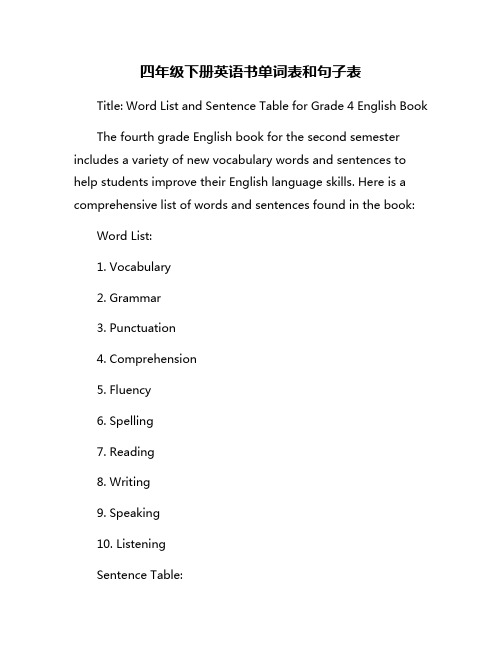
四年级下册英语书单词表和句子表Title: Word List and Sentence Table for Grade 4 English BookThe fourth grade English book for the second semester includes a variety of new vocabulary words and sentences to help students improve their English language skills. Here is a comprehensive list of words and sentences found in the book:Word List:1. Vocabulary2. Grammar3. Punctuation4. Comprehension5. Fluency6. Spelling7. Reading8. Writing9. Speaking10. ListeningSentence Table:1. My favorite subject is English.2. I enjoy reading books every day.3. Can you help me with my homework?4. We have a spelling test on Friday.5. She is a fluent English speaker.6. Please punctuate your sentences correctly.7. The teacher asked us to read a passage.8. I need to work on my writing skills.9. Let's practice speaking English together.10. Listening is an important skill in language learning.The word list and sentence table provide a strong foundation for students to build upon as they continue to develop their English language proficiency. By mastering the vocabulary words and using them in context through the sentences, students can enhance their reading, writing, speaking, and listening abilities. With regular practice and reinforcement, students can become proficient in English and effectively communicate in the language.Overall, the fourth grade English book offers a comprehensive and engaging approach to learning English, encompassing vocabulary words, grammar rules, punctuation guidelines, comprehension strategies, fluency exercises, spelling activities, reading comprehension passages, writing prompts, speaking opportunities, and listening exercises. Through this holistic approach, students can enhance their English language skills and become confident and proficient communicators.。
湘少版(三起)四年级英语下册Unit8 I come from China课件

以-teen结尾的数字(13-19)
13 thirteen 15 fifteen
14 fourteen 16 sixteen
17 seventeen 18 eighteen
19 nineteen
以-ty结尾的数字
20 twenty 40 fourty 60 sixty 80 eighty
30 thirty 50 fifty 70 seventy 90 ninety
2.Today is Tuesday. Tomorrow is Wednesday.
3.Today is Wednesday. Tomorrow is Thursday.
4.Today is Thursday. Tomorrow is Friday.
China
Australi a
the USA
France
语音过关 1,Unit8和unit9 A和B部分 2, 练习题完成后请私发给我检查,请同学们 自觉完成
每周星期二和星期四过关语音
¥5
How much is it ? It is five yuan.
¥35
How much is it ?
It's thirty-five yuan.
How much is it ?
¥98
It's ninety-eight yuan.
¥56 schoolbags
How much are they?
They are 100 yuan.
eye head ear hair mouth leg knee foot arm shoulder
ear hair
mouth nose toe hand eye arm
四年级下册第八单元英语课文
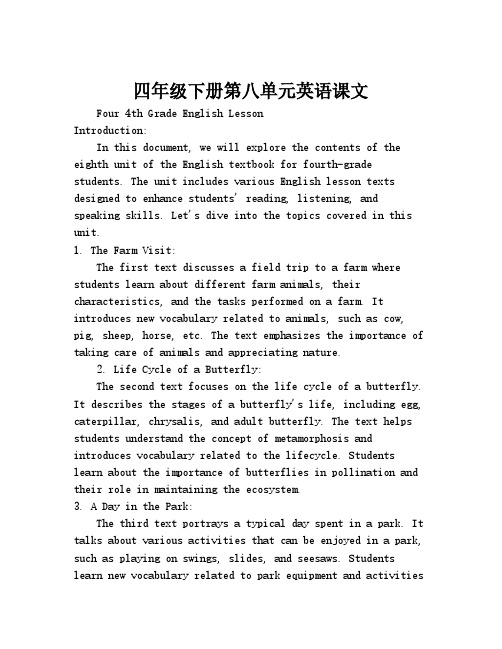
四年级下册第八单元英语课文 Four 4th Grade English LessonIntroduction: In this document, we will explore the contents of the eighth unit of the English textbook for fourth-grade students. The unit includes various English lesson texts designed to enhance students' reading, listening, and speaking skills. Let's dive into the topics covered in this unit.1. The Farm Visit: The first text discusses a field trip to a farm where students learn about different farm animals, their characteristics, and the tasks performed on a farm. It introduces new vocabulary related to animals, such as cow, pig, sheep, horse, etc. The text emphasizes the importance of taking care of animals and appreciating nature. 2. Life Cycle of a Butterfly: The second text focuses on the life cycle of a butterfly. It describes the stages of a butterfly's life, including egg, caterpillar, chrysalis, and adult butterfly. The text helps students understand the concept of metamorphosis and introduces vocabulary related to the lifecycle. Students learn about the importance of butterflies in pollination and their role in maintaining the ecosystem.3. A Day in the Park: The third text portrays a typical day spent in a park. It talks about various activities that can be enjoyed in a park, such as playing on swings, slides, and seesaws. Students learn new vocabulary related to park equipment and activitieslike running, jumping, and having picnics. The text enhances students' comprehension skills and enables them to describe their own experiences in a park.4. Why I Love My Family: The fourth text focuses on the theme of family. It encourages students to express their love and appreciationfor their family members. The text provides examples of how family members support and care for each other. Vocabulary related to family members like father, mother, brother, sister, etc., is introduced. Students also learn to describe their family members and express their feelings.5. The Amazing Rainforest: The fifth text introduces students to the wonders of the rainforest. It provides information about the diverse plants and animals found in this ecosystem. Students learn vocabulary related to rainforest species and characteristics such as tall trees, colorful birds, unique flowers, etc. The text raises awareness about the importance of preserving rainforests and understanding the concept of biodiversity.6. Fun with Fractions: The sixth text introduces basic concepts of fractions to students. It explains the concept of equal parts, numerator, and denominator using simple examples. Students are given exercises to practice dividing shapes into equal parts and identifying different fractions. The text aims to develop students' mathematical skills and problem-solving abilities. Conclusion: In this unit, fourth-grade students are exposed to a variety of engaging and informative texts that cover topics such as farm visits, the life cycle of a butterfly, park activities, family love, the beauty of rainforests, and basicfractions. These texts contribute to improving students' English reading, listening, vocabulary, and comprehension skills. By exploring these themes, students gain knowledge about the world around them and develop a broader perspective.。
新人教精通版四年级英语下册 Lesson8_教学课件.ppt
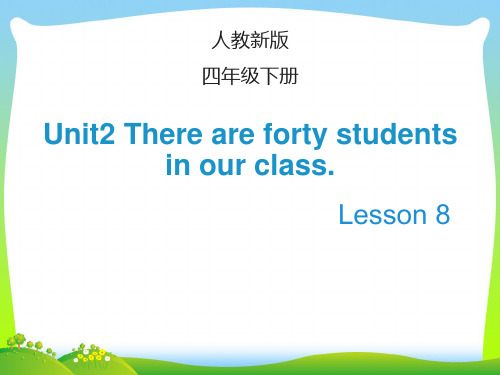
Unit2 There are forty students in our class.
Lesson 8
Warm-up
Let’s sing
(单击图片可播放动画)
Lead-in
Game 数字接龙
one two three …
Presentation Let’s learn
girl
Homework
1. 登录“优教同步学习网”,跟读课文 Just talk部分的录音,注意语音、语调。 2. 调查学校中任意两个班级的总人数和 男女生人数,并制成一张表格。 3. 登录“优教学习网”,预习Lesson 9。
Close
• 9、春去春又回,新桃换旧符。在那桃花盛开的地方,在这醉人芬芳的季节,愿你生活像春天一样阳光,心情像桃花一样美丽,日子像桃子一样甜蜜。 2020/6/92020/6/9Tuesday, June 09, 2020
• 10、人的志向通常和他们的能力成正比例。2020/6/92020/6/92020/6/96/9/2020 12:41:48 PM
• 11、夫学须志也,才须学也,非学无以广才,非志无以成学。2020/6/92020/6/92020/6/9Jun-209-Jun-20
• 12、越是无能的人,越喜欢挑剔别人的错儿。2020/6/92020/6/92020/6/9Tuesday, June 09, 2020
• 17、一个人如果不到最高峰,他就没有片刻的安宁,他也就不会感到生命的恬静和光荣。2020/6/92020/6/92020/6/92020/6/9
谢谢观看
• 13、志不立,天下无可成之事。2020/6/92020/6/92020/6/92020/6/96/9/2020
PEP小学英语全套教材分析
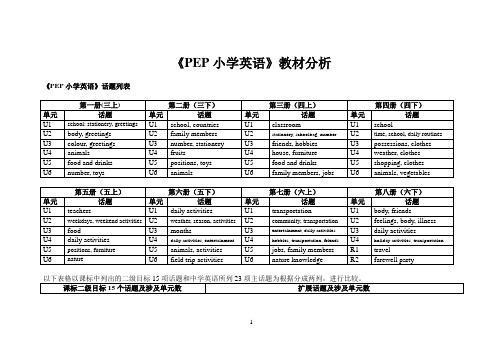
《PEP小学英语》教材分析《PEP小学英语》话题列表12人情况、家庭、学校等。
整套教材涉及较多(超过4个单元)的话题包括:数字、文体活动、学校、节日、语言文化、社会、家庭、食品、交通。
教材作为要求掌握内容的AB部分所涉及的话题多为课标二级目标所推荐的话题,并且分布比较均匀。
扩展话题主要集中在日常生活和交通两方面,较为贴近学生日常生活。
教材在话题处理方面充分利用了选学的C板块,把一些相对来说涉及内容较复杂并专业化,难以简单描述的话题,如:语言文化、国家社会、节日、中外史地常识等内容放在C部分Culture和Good to know板块,只作为了解内容,不做掌握要求。
这样一方面能扩大学生的视域,另一方面又避免把复杂的语言材料呈现给学生,造成他们理解和掌握上的困难。
语音内容3开闭音节中的发音、47个字母组合的发音、48个国际音标以及查字典的技能,实现了课标语言知识二级目标中对于语音的要求。
另外,教材设定独立板块处理语音,又根据册次对语音内容进行梳理,都会方便教师有针对性地进行课堂语音知识教学。
但教材在五年级上下册集中呈现47个字母组合,未同时呈现音标,作为巩固练习的绕口令难度较大,难以扎实掌握字母组合的读音;教材在六年级上下册呈现了48个音标,教学内容较多,所选例词因要同时呈现某个元音和辅音而受限,较为生僻。
基于此,六年级音标的教学可疏散到五年级处理一部分,使得字母组合、音标与语义相融合,选词时以呈现某个辅音或元音为主,尽量选择以前册次的认读词,使得这一板块突出单词拼读的功能,培养学生通过语音来记忆单词的能力。
文化内容《PEP小学英语》的文化部分内容可分为两个层次,一方面是教材每单元必学的语言材料通过情景设定所渗透出的文化含义,可称为文化“暗线”。
这一部分的内容有教学要求,因此多为常见交际用语以及与食品、日常文体活动等话题相关的语言,易教宜学。
另4一方面,教材设定了专门的文化板块,三年级上、下册名为Culture,四年级上册至六年级下册则拓宽了内容,标题改为Good to know。
小学英语教案:四年级下册Unit 8英文表格式

四年级英语下册Unit 8英文教案表格式teaching plandate:5/23 teacher: miatext bookfun with english 4bunit8titleopen dayperiod 1aims 1. students can use the sentence pattern “there be” to describe the decorations. pay attention to the singular form and plural form. ss should know when to use there is and when to use there are.2. to present students vocabularies, familiarize and enable to recognize, and try to spell.3. to cultivate their interest of learning english and the consciousness of communicating in english.main points and difficult points1. vocabulary: vocabulary: a chair, a blackboard, a computer, a picture, a bookcase, a tape recorder, a music room, an office, a playgroundthe students can say and spell the old words fluently. and say the new words correctly.2. sentence: what’s in the classroom? there is / are … what’s in/ on/ near …? there is / are …in/ on/ near …the students can use the dialogues in life.aids pictures, tape recorder, multimedia,step 1 everyday reportstudents say a sentence about today in english.step 2 presentation and b: look, read and learn1. t: look at my picture. so what’s this?s: a picture.t: what can you see in the picture?s: i can see a library.t: what can you see in the library?s: i can see some chairs, some computers and some bookcasest: can you see any chairs / computers / bookcases in our classroom?s: yes, i can. / no, i can’t.2. t: what can you see in this picture? (a music room)s: i can see a piano, a violin and an accordion. t: is this a library? is this a …?s: no, it isn’t.t: what’s this in english?s: it’s a music room.t: i can see … in the music room.3. sing a song: in the music room. in the music room, there’s a little piano, whenever we sing, it will sing along, do, te, la, so, me, so, do, te, le, so, whenever we sing, it will sing along.t: what’s in the music room?ss: a little piano. t: yes, there’s a little piano. write on the blackboard, and get students to read it. ask more question, what else is in the music room?ss: there’s… /there are….4. t: look at this picture. is this a music room?s: no, it isn’t.t: it’s an office. ss: office.t: what’s in the office?s: there is a bookcase in the office.。
英语书四年级下册八单元单词
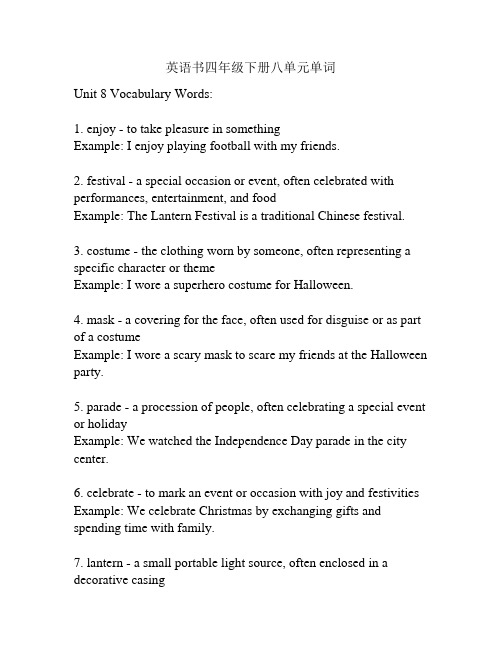
英语书四年级下册八单元单词Unit 8 Vocabulary Words:1. enjoy - to take pleasure in somethingExample: I enjoy playing football with my friends.2. festival - a special occasion or event, often celebrated with performances, entertainment, and foodExample: The Lantern Festival is a traditional Chinese festival. 3. costume - the clothing worn by someone, often representing a specific character or themeExample: I wore a superhero costume for Halloween.4. mask - a covering for the face, often used for disguise or as part of a costumeExample: I wore a scary mask to scare my friends at the Halloween party.5. parade - a procession of people, often celebrating a special event or holidayExample: We watched the Independence Day parade in the city center.6. celebrate - to mark an event or occasion with joy and festivities Example: We celebrate Christmas by exchanging gifts and spending time with family.7. lantern - a small portable light source, often enclosed in a decorative casingExample: During the Mid-Autumn Festival, children carry lanterns with different shapes and colors.8. gather - to come together as a group or crowdExample: We gathered in the park to have a picnic.9. present - a gift given to someoneExample: I received many presents on my birthday.10. symbol - an object or image that represents or stands for something elseExample: The dove is a symbol of peace.11. celebrate - to mark an event or occasion with joy and festivities Example: We celebrate New Year's Eve by watching the fireworks.12. tradition - a belief, custom, or practice that is passed down from generation to generationExample: It is our family tradition to have a big dinner on Thanksgiving.13. custom - a traditional way of doing somethingExample: It is a custom in Japan to take off your shoes before entering a house.14. reunion - a gathering of people who have not seen each other for a long timeExample: My family had a reunion last summer; it was great to see everyone again.15. prayer - a solemn request or expression of thanks to a deity or higher powerExample: We say a prayer before dinner to give thanks for the food.16. exchange - to give something and receive something else in returnExample: During Christmas, people exchange gifts with their loved ones.17. joy - a feeling of great happiness or delightExample: The birth of a baby brings joy to the family.18. farewell - an expression of goodbye or farewell to someone leavingExample: We said our farewells to our friends before moving to a new city.19. performance - a public display of skills, often in music, dance, or theaterExample: We watched a wonderful ballet performance at the theater.20. sing - to produce musical sounds with the voiceExample: We like to sing our favorite songs in the car while traveling.Note: The above examples are given to illustrate the usage of each word. Please note that this is just a guideline and you can always create your own sentences using these vocabulary words.。
四年级下册英语Unit8Whatareyoudoing教学课件(教科版)

Let’s find
直接加ing
Read--reading
以不发音e结尾,去e+ing
dance---dancing , write--writing…..
以末尾音节为辅元辅,双写末尾字母加ing
swim---swimming , run---running…..
Let’s say
Let’s watch and say
1.How many people are there in the dialogue(对话). Who are they?
There are……… 2.What is Ben doing?
He is………
Let’s watch and say
1. What is grandma doinies
Unit 8 What are you doing?
学习目标
1.会用以下英文句子询问你正在干什么? ---What are you doing? ---I am..... ---What is he/she doing? ---He/she is.....
when I grow up, I want to be a ..., I want to ...
actvities
fly a kite go fishing
do housework
see a film take exercise draw pictures go swimming
go running
Let’s sing
What are you doing ? What are you doing? What are you doing?Dear Jane I am singing , I am dancing I am having a happy time?
四年级英语下册Unit 8(16)课件 苏教牛津版

单词辩音,用“S”“D”表示
1.much China
(S )
2.chocolate school (D )
3. chair shirk
( D)
4. T-shirt English ( S )
5. tree three
(D)
6. hundred driver ( S )
桌子上有只大盒子。
让我们打开它。 好的。
6
bright sometimes songbook lots of
明亮的 有时候 歌本 许多
T-shirt
体恤衫
smart map word them
China
好看的 地图 字 它们(宾格)
中国
1.一件新T恤 a new T-shirt 2.一些字 some words 3.读它们 read them 4.中国地图 a map of China 5.我爱中国 I love China
supermarket airport
hospital
看图回答问题
1.What’s on the wall? 2.What’s on the bed? 3.What’s in the bookcase? 4.What’s near the window? 5.What’s on the desk?
哦,有两只小盒子。
行。
让我们打开蓝色盒子。
哇,有一个玩具火车。 让我们打开黄色盒子。
哇!
ቤተ መጻሕፍቲ ባይዱ
1.一只大盒子 2.在桌子上 3.两只小盒子 4.打开蓝色盒子 5.一个玩具火车 6.打开黄色盒子
library
playground
Open your English books. P7c8lassroom
英语四年级下册第八单元课文

英语四年级下册第八单元课文In the eighth unit of the fourth-grade English textbook, the students are introduced to a new story titled 'The Lost Kitten.' This story revolves around a little girl named Sarah who finds a lost kitten and goes on a journey to reuniteit with its owner. The story not only aims to improve the students' reading skills but also teaches them important values such as kindness, empathy, and responsibility. However, the text also presents some challenges for the students, such as understanding new vocabulary and grasping the main idea of the story.One of the main challenges that the students may face while reading this story is understanding the new vocabulary. The text introduces several new words and phrases, such as 'lost,' 'stray kitten,' and 'reunite,' which may be unfamiliar to the students. This can make it difficult for them to comprehend the story and may hinder their overall understanding of the plot. To overcome this challenge, the teacher can pre-teach the new vocabulary before reading the story, provide visual aids or real-life examples, and encourage the students to use the new words in sentences to reinforce their understanding.Another challenge that the students may encounter is grasping the main idea of the story. 'The Lost Kitten' is a narrative that involves various events and characters, which may confuse the students and make it challenging for them to identify the central theme of the story. To address this issue, the teacher can employ reading comprehension strategies such as predicting, questioning, and summarizing to help the students extract the main idea and key details from the text. Additionally, the teacher can engage the students in discussions about the story's plot, characters, and themes to deepen their understanding.On the other hand, 'The Lost Kitten' also presents an opportunity for the students to develop their reading and comprehension skills. By engaging with the story, the students can enhance their ability to read and understand English texts, as well as improve their vocabulary and language proficiency. Furthermore, thestory's focus on empathy, kindness, and responsibility can also help the students cultivate important moral values and social skills. Through the character of Sarah, the students can learn the importance of helping others and taking care of animals, which can have a positive impact on their personal development.In addition to the academic and moral benefits, 'The Lost Kitten' can also evoke emotional responses from the students. The story's heartwarming narrativeand relatable characters can elicit feelings of empathy, compassion, and joy,which can create a more engaging and meaningful reading experience for the students. As they follow Sarah's journey to reunite the lost kitten with its owner, the students may experience a range of emotions, from concern for the kitten'swell-being to happiness when it is finally reunited with its owner. This emotional engagement can not only make the reading experience more enjoyable for thestudents but also help them connect with the story on a deeper level.Overall, 'The Lost Kitten' in the fourth-grade English textbook offers both challenges and opportunities for the students. While the story may present difficulties in understanding new vocabulary and grasping the main idea, it also provides a chance for the students to enhance their reading and comprehension skills, learn important moral values, and experience emotional engagement. Withthe support and guidance of the teacher, the students can navigate through these challenges and derive maximum benefit from the story, ultimately enriching their English language learning experience.。
四年级下册英语u8课文中文
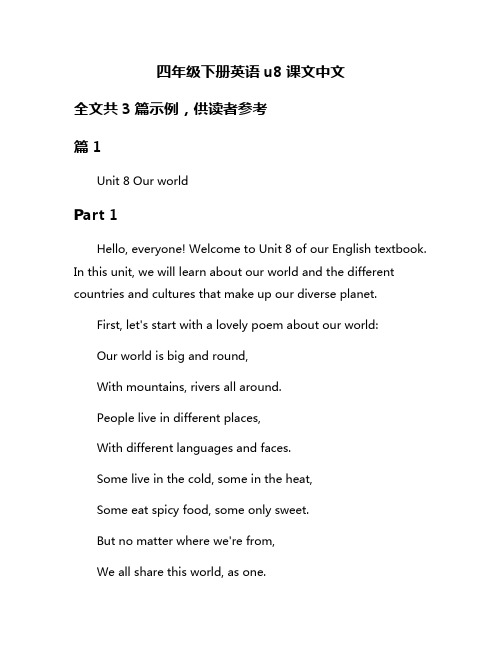
四年级下册英语u8课文中文全文共3篇示例,供读者参考篇1Unit 8 Our worldPart 1Hello, everyone! Welcome to Unit 8 of our English textbook. In this unit, we will learn about our world and the different countries and cultures that make up our diverse planet.First, let's start with a lovely poem about our world:Our world is big and round,With mountains, rivers all around.People live in different places,With different languages and faces.Some live in the cold, some in the heat,Some eat spicy food, some only sweet.But no matter where we're from,We all share this world, as one.Next, we will learn about some of the countries in the world and their unique cultures. We will explore the rich history of China, the beautiful beaches of Australia, the delicious food of Italy, and many more.We will also learn about the different languages spoken around the world and how to greet people in different languages. For example, in Chinese, you say "ni hao," in Spanish, you say "hola," and in French, you say "bonjour."In addition to learning about different countries and cultures, we will also learn about the importance of respecting and celebrating diversity. We will discuss how we can be kind and understanding towards people from different backgrounds, and how we can learn from each other's differences.Overall, this unit is all about celebrating the wonderful diversity of our world and appreciating the unique cultures and traditions that make our planet so special. I hope you enjoy learning about our world in this unit! Thank you for reading.篇2Unit 8 Let's celebrate!Lesson 1 BirthdayIt's Sarah's birthday today. She is very excited. She runs downstairs and sees a big present on the table. She opens it. It's a new bike! She is very happy. She says, "Thank you, mum and dad!"Sarah’s friends come to her party in the afternoon. They sing 'Happy Birthday' and help her blow out the candles on the cake. Sarah cuts the cake and gives her friends a piece each. They eat the cake and drink orange juice. After that, they play games and have a great time.Lesson 2 HalloweenHalloween is coming. Jack and Lily are very excited. They decide to be a ghost and a witch for Halloween.They go to the shop and buy costumes and decorations. They decorate their house with pumpkins, ghosts, and bats. Jack dresses up as a ghost and Lily dresses up as a witch. They go out trick-or-treating around the neighborhood.They knock on doors and say, "Trick or treat!" people give them candy. They get a lot of candy and have so much fun.Lesson 3 ChristmasIt's Christmas time. The streets are full of lights and decorations. Tim and Emma are excited for Christmas.They write letters to Santa asking for presents. They decorate their Christmas tree with tinsel, ornaments, and lights. On Christmas Eve, they put out cookies and milk for Santa and carrots for the reindeer.In the morning, they wake up and see presents under the tree. They open their presents and play with their new toys. They have a big Christmas lunch with their family. They sing Christmas carols and have a wonderful time together.Lesson 4 New YearIt's New Year's Eve. Tom and Amy are getting ready for the New Year's party. They decorate the house with balloons and streamers. They put on party hats and blow horns.At midnight, they watch the fireworks outside and cheer. They hug each other and say, "Happy New Year!" They make a wish for the new year and have a great time celebrating.In the morning, they have a big breakfast with their family and talk about their resolutions for the new year. They are excited for what the new year will bring.Unit 8 Let's celebrate! is a fun and exciting unit that teaches children about different celebrations and traditions around the world. It helps them learn about the importance of family,friendship, and joy in celebrating special occasions. Through engaging stories and activities, children can learn new vocabulary and expressions while having fun. Celebrating together with friends and family creates lasting memories and strengthens bonds. Let's celebrate every moment and cherish the joy of being together.篇3Unit 8: It's time to go home.In this unit, we will learn how to talk about daily routines, telling the time, and following a daily schedule. We will also practice asking and answering questions about time and schedules.First, let's learn some key vocabulary related to daily routines.1. Wake up2. Brush teeth3. Take a shower4. Have breakfast5. Go to school6. Have lunch7. Do homework8. Play with friends9. Have dinner10. Watch TV11. Go to bedNow, let's learn how to tell the time in English.- We use "o'clock" to talk about the exact hour (e.g. it's 8o'clock).- We use "half past" to talk about 30 minutes past the hour (e.g. it's half past 3).- We use "quarter past" and "quarter to" to talk about 15 minutes past or 15 minutes to the hour (e.g. it's quarter past 6, it's quarter to 2).Next, let's talk about daily schedules. Here is an example of a daily schedule:- 7:00 AM: Wake up- 7:30 AM: Brush teeth- 8:00 AM: Have breakfast- 8:30 AM: Go to school- 12:00 PM: Have lunch- 3:00 PM: Do homework- 5:00 PM: Play with friends- 6:00 PM: Have dinner- 8:00 PM: Watch TV- 9:00 PM: Go to bedNow, let's practice asking and answering questions about time and schedules.Example 1:- What time do you wake up?- I wake up at 7:00 AM.Example 2:- What time do you go to school?- I go to school at 8:30 AM.Finally, it's important to follow a daily routine and schedule to stay organized and manage your time effectively. Bypracticing telling the time and talking about daily routines, you will improve your English skills and be able to communicate confidently in everyday situations.Remember to review the vocabulary, practice telling the time, and create your own daily schedule to continue practicing your English skills. Good luck!。
冀教版小学四年级下册第八册英语课件:Lesson 9 When Is It(课件1)

庆祝六一儿童节
Children’s Day is in June .
• June the first is Childr en’s Day.
July the first is the Birthday of CCP.
The Birthday of CCP is in July .
August the first is Army Day
March the eighth is Women's Day.
Women’s Day is in March .
April the fifth is Qingming Festival
Qingming Festival is in April .
May Day is in May .
• May the first is Internation al Worker's Day.
Army Day is in August .
Teachers’ Day is in September .
• September the tenth is Te achers’ Day.
National Day is in October .
•October the first is National Day.
A. Teacher’s Day B. New Year’s Day C. National Day
( )4. September the tenth is‗‗.
A. Teacher’s Day B. New Year’s Day C. National Day
A. June B. July C. August ﹙ ﹚2. Today is March sixth. Yes terday was __________.
- 1、下载文档前请自行甄别文档内容的完整性,平台不提供额外的编辑、内容补充、找答案等附加服务。
- 2、"仅部分预览"的文档,不可在线预览部分如存在完整性等问题,可反馈申请退款(可完整预览的文档不适用该条件!)。
- 3、如文档侵犯您的权益,请联系客服反馈,我们会尽快为您处理(人工客服工作时间:9:00-18:30)。
小学英语——Word Lists
小学英语小四下学期
Word List1 (by unit)
Unit 1 Good habits
early / brush / tooth (teeth) / face / comb / late / finish / pack / schoolbag / hang up / how often / once / twice / habit / Student of Year / after / hospital / hurry up
Unit 2 Good manners
corridor / polite / rude / noisy / rubbish / should / shouldn’t=should not / rule / model student / note / every / choose
Unit 3 Seasons
winter / snow / autumn / cool / warm / rain / spring / summer / holiday / camp / snowman / ride / why / because / ugly / sad / swan / beautiful
Unit 4 Feeling sick
medicine / fever / cold / rest / headache / stomachache / advice / toothbrush / biting / surface / inside / chocolate
Unit 6 Plants
grow / pot / soil / light / large / experiment / guess / happen / quickly / slowly / die / remember / love / learn / about / tonight / fall / root / into / bee / wind
Unit 7 Future living
lamp / vase / stair / lab=laboratory / sofa / upstairs / telephone / DVD player / DVD / radio / machine /future / will / hotel / Earth / space / far / spaceship / try
Unit 8 Helping tourists
airport / museum / temple / station / stadium / right / left / turn / straight / follow / problem / crowded
Unit 9 Festivals
Easter / the Dragon Boat Festival / Halloween / trick / treat / which / festival / costume / older / knock / Jack-o’-lantern / lantern / pumpkin
Word List 2 (in alphabetical order)
A a
about / advice / after / airport / autumn
B b
beautiful / because / bee / biting /brush
C c
camp / chocolate / choose / cold / comb / cool / corridor / costume / crowded
D d
die / the Dragon Boat Festival / DVD / DVD player
E e
early / Earth / Easter / every / experiment
F f
face / fall / far / festival / fever / finish / follow / future
G g
grow / guess
H h
haibit / Halloween / hang up / happen / headache / holiday / hospital / hotel / how often / hurry up
inside / into
L l
Jack-o’-lantern
K k
knock
L l
lab=laboratory / lamp / lantern / large / late / learn / left / light / love
M m
machine / medicine / model student / museum
N n
noisy / note
older / once
P p
pack / polite / pot / problem /pumpkin
Q q
quickly
R r
radio / rain / remember / rest / ride / right / root / rubbish / rude / rule
S s
sad / schoolbag / should / shouldn’t=should not / slowly / snow / snowman / sofa / soil / space / spaceship / spring / stadium / stair / station / stomachache / straight / Student of th Year / summer / surface / swan
T t
telephone / temple / tonight / tooth(teeth) / toothbrush / treat / trick / try / turn / twice
U u
ugly / upstairs
V v
vase
W w
warm / which / why / will / wind / winter
Useful Expressions
What are you doing?
Do you feel better today?
Good for you.
We miss you.
Get well soon.
Oh, here it is.
It’s over there, on the right.
You can follow me.
Excuse me. Where is the toilet please? It’s no problem.。
